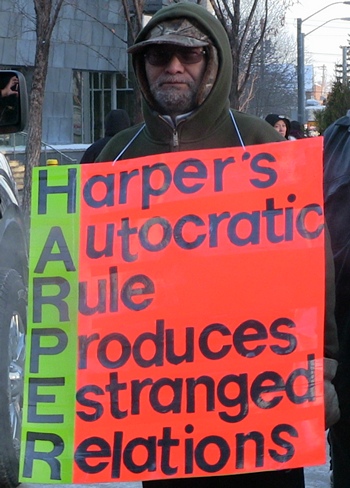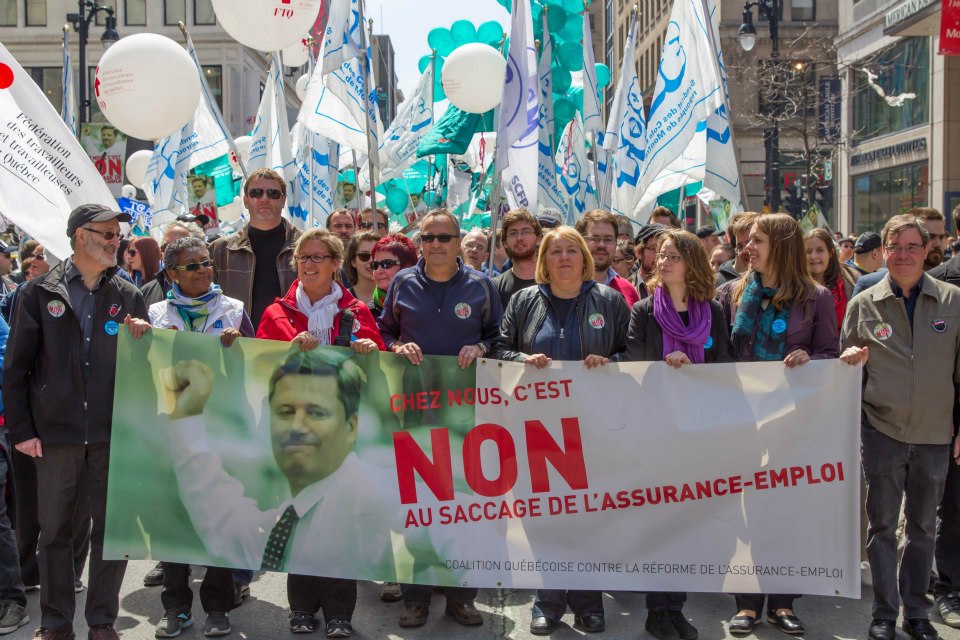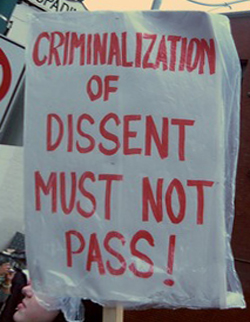|
June 28, 2013 - No. 81
Parliament Rises for the Summer
Unite in Action to Stop and Defeat the
Harper Government's Anti-Social Agenda
Parliament Rises
for the Summer
• Unite in Action to Stop and Defeat the Harper
Government's Anti-Social Agenda
• Climate of Rumours and Controversy
• Character of This Sitting of the House
• Senate Rejection of Anti-Union Private
Member's Bill Deepens Crisis of Government
For Your Information
• Legislation Receiving Royal Assent on June 19
• Note to Readers
Parliament Rises for the Summer
Unite in Action to Stop and Defeat the Harper
Government's Anti-Social Agenda
The House of Commons rose for the summer on June 19, two
months past the half-way point in the Harper government's bogus mandate
to pursue its anti-social agenda. The Conservative Party engineered an
electoral coup in 2011 to gain a majority of seats using fraudulent
high-tech voter targeting and voter suppression. A Federal Court judge
affirmed publicly that fraud had taken place to bring the Harperites to
power. Using millions of dollars, unlimited mass media support, voter
suppression and a micro-targeting machine in specific ridings, the
Conservatives took state power with merely 24.3 per cent of the
eligible votes.
 The
assertion that the Harper government is one desired by Canadians is
day-by-day crumbling, leaving an empty claim that it has the power to
do as it please regardless of the fraud and growing disgust and
opposition of Canadians, Quebecois and First Nations. Harper's
countless words that his government is accountable and working for the
economy and national interest have been exposed as empty rhetoric. His
actions and those of government officials at the highest levels reveal
all manner of fraud, corruption, bullying and other criminal activity
in the service of narrow private interests, at the expense of the
interests of the people and the country. The
assertion that the Harper government is one desired by Canadians is
day-by-day crumbling, leaving an empty claim that it has the power to
do as it please regardless of the fraud and growing disgust and
opposition of Canadians, Quebecois and First Nations. Harper's
countless words that his government is accountable and working for the
economy and national interest have been exposed as empty rhetoric. His
actions and those of government officials at the highest levels reveal
all manner of fraud, corruption, bullying and other criminal activity
in the service of narrow private interests, at the expense of the
interests of the people and the country.
The more Harper tries to divert the people from the
stench of corruption by attacking others, the more revelations continue
to emerge, sinking the government and the entire cartel party system
deeper and deeper into a crisis of legitimacy. No doubt the Harper
government was eager to see this sitting come to an end and hopes that
during the summer it will "turn the corner" on the cascading scandals.
For the Workers' Opposition, resolving this crisis in a
manner that favours the working people and does not lead to more of the
same is a practical problem to be sorted out during the two years
before the next federal election.

Climate of Rumours and Controversy
The House of Commons ended its winter session amid a
series of scandals and controversy as the Conservatives used time
allocation to rush various bills through with a minimum of debate.
The RCMP has announced an investigation of PMO Chief of
Staff Nigel Wright, who admitted to giving $90,000 to Senator Mike
Duffy to re-pay ineligible housing expense claims. In connection with
the investigation, the RCMP has seized the election returns of nine
Conservative MPs who used Duffy to promote their election campaigns.
Several other Conservative and Liberal Senators are facing audits of
their expenses by the Internal Economy Committee, some going back more
than six years.
 In
the face of these and other scandals, the Harper government called for
the unanimous consent of all Parties to adjourn the House of Commons.
As no agreement could be reached on adjourning the House early, on May
21 a motion was passed stating that the House would sit until midnight
from Mondays to Thursdays for the rest of the session -- until June 21. In
the face of these and other scandals, the Harper government called for
the unanimous consent of all Parties to adjourn the House of Commons.
As no agreement could be reached on adjourning the House early, on May
21 a motion was passed stating that the House would sit until midnight
from Mondays to Thursdays for the rest of the session -- until June 21.
NDP House Leader Nathan Cullen criticized the government
for the way bills have been moved through the legislative process. In
an interview with The Hill Times Mr. Cullen said, "I find it
ironic that the government allots only five hours of debate to the
content of the bill under time allocation, when the vast majority of
our time is spent debating and voting on the time allocation motions
and not on the bills. That is the Conservatives' way of doing business.
When will the leader of the government in the House of Commons learn
that a hammer is not the only tool available for getting the work done?"
Independent MP Bruce Hyer (Thunder Bay-Superior North)
said, "We've got a government which has now done time allocations, I
think it's 45 times, and you know, if we don't have time to properly
debate bills and get our work done properly, then we don't have time to
go home early."
As the House adjourned for the summer, along with
accusations that the Conservative government is stifling debate and
ramming through legislation, were rumours that Harper will make a major
Cabinet shuffle this summer. The House is scheduled to reconvene on
September 16 and many are predicting that Harper will prorogue
Parliament until October and then begin a new session with a Throne
Speech.
These predictions may or may not be accurate but one
thing is sure: the Harper Conservatives are desperately trying to cover
up all the scandals that have hit the party and the government at all
levels including the PMO. Their every action is based on damage control
and survival and has nothing to do with dealing with the problems faced
by the majority of Canadians.

Character of This Sitting of the House
The House of Commons ended its winter sitting by giving
Royal Assent to 19 pieces of legislation. The House will resume sitting
on September 16 unless, as has been rumoured, Harper prorogues the
session. The large amount of anti-social legislation rammed through in
the last three weeks was accomplished by the Harperites arbitrarily
passing a motion on May 21 to extend the sitting hours of the House of
Commons until midnight for the final month of the session, a measure
normally reserved for the week before the House rises for the summer.
The sitting could be characterized as an opaque omnibus
one, as many pieces of legislation were rammed through the House
without Canadians having any knowledge or real say about their contents
and significance, even where they were directly affected, such as in
the case of the First Nations and the organized working class.
 The
sitting was also characterized by the steadfast resistance of First
Nations and their allies to the Harper government's assault on their
rights and dignity. Fittingly, it opened on January 28, 2013 with the
First Nations and their allies rallying on Parliament Hill to oppose
the various pieces of legislation the Harper government was set to
debate and eventually pass. Those bills directly target the hereditary,
constitutional and treaty rights of First Nations. Amongst other
measures, they seek to impose fee simple onto the land and resources of
First Nations so that those same lands and resources can be stolen from
them in various ways. Showing the arrogance of the Harperites and their
refusal to negotiate with First Nations on a nation-to-nation basis,
the legislation the government tabled concerning First Nations has been
passed despite overwhelming opposition from First Nations themselves
and their allies and supporters in Canada and around the world. The
sitting was also characterized by the steadfast resistance of First
Nations and their allies to the Harper government's assault on their
rights and dignity. Fittingly, it opened on January 28, 2013 with the
First Nations and their allies rallying on Parliament Hill to oppose
the various pieces of legislation the Harper government was set to
debate and eventually pass. Those bills directly target the hereditary,
constitutional and treaty rights of First Nations. Amongst other
measures, they seek to impose fee simple onto the land and resources of
First Nations so that those same lands and resources can be stolen from
them in various ways. Showing the arrogance of the Harperites and their
refusal to negotiate with First Nations on a nation-to-nation basis,
the legislation the government tabled concerning First Nations has been
passed despite overwhelming opposition from First Nations themselves
and their allies and supporters in Canada and around the world.
This session of the House came under attack from workers
across Canada, especially in Quebec and the Maritimes, who engaged in
actions to oppose the government's anti-social reforms of Employment
Insurance (EI). The aim of the changes to EI, passed using the
government's second omnibus budget bill, Bill C-45, is further to turn
workers into a pool of cheap labour at the disposal of monopoly
capital. Similar to its Temporary Foreign Worker program of indentured
labour, the anti-social EI reforms are to ensure that whenever the
labour market in any region of the country swings even slightly in
favour of the working class allowing it to defend and improve its
standard of living and working conditions, the Harper government is
there to swing the labour market back in favour of monopoly capital.
The anti-social changes to EI do nothing to solve the chronic problems
of unemployment and underemployment in certain regions of the country.
 This
session was also characterized by growing opposition from workers
across Canada to the government's use of back-to-work orders suspending
the legitimate strike actions of workers and to the private member's
Bill C-377 targeting unions. Anti-worker Bill C-377 was too much to
stomach for even certain Conservative Senators who voted with the
majority against the bill, a strong rebuke of Harper. The anti-worker
measures within Bill C-377 singling out unions for intrusive state
abuse, which the Harperites say are necessary to enforce
"accountability and transparency," have become a target of ridicule and
cries of hypocrisy given the PMO's penchant for utter secrecy, control
and non-transparency in all the government's affairs, including even in
its strict control of Conservatives. This
session was also characterized by growing opposition from workers
across Canada to the government's use of back-to-work orders suspending
the legitimate strike actions of workers and to the private member's
Bill C-377 targeting unions. Anti-worker Bill C-377 was too much to
stomach for even certain Conservative Senators who voted with the
majority against the bill, a strong rebuke of Harper. The anti-worker
measures within Bill C-377 singling out unions for intrusive state
abuse, which the Harperites say are necessary to enforce
"accountability and transparency," have become a target of ridicule and
cries of hypocrisy given the PMO's penchant for utter secrecy, control
and non-transparency in all the government's affairs, including even in
its strict control of Conservatives.
Of importance during the session was the active
opposition to Harper's anti-social agenda by more and more scientists,
librarians, diplomats and other government employees across Canada.
They are raising their voices against the government's attacks on their
professions, science and the participation of people in decision-making
and its attempts to muzzle concerned public sector workers and prohibit
them from doing their jobs.
The government used another omnibus budget bill to
attack the Health Council of Canada and the current arrangements
upholding the Canada Health Accord. It also took measures to usurp
control over crown corporations by placing their relations with their
employees under the arbitrary dictate of the Harper executive. This is
a direct attack on the longstanding principle of free and fair
collective bargaining with the various unions of public sector workers.
It drags Canada back into the pre-war era of open season on workers,
when the state and monopoly capital targeted workers individually as
fair game and criminalized their collective defence, in particular
denying public sector workers their elementary right to organize
legally to defend themselves collectively.
The Harper government used the winter session of the
House to entrench its anti-social agenda in the service of the private
interests of the most powerful monopolies and to criminalize political
opposition and those Canadians defending their economic interests and
the rights of all. Celebrating imperialist aggression, criminalizing
resistance, attacking workers and their organizations, and giving the
state more powers over First Nations and their territories in the name
of helping them, has been the overall direction of the Harper
government in this sitting.
 It
passed legislation to entrench measures that give the state and its
security agencies increased arbitrary powers to arrest and detain
people on suspicion of conspiracy to commit or support terrorism. This
legislation includes measures to hide the role of those same state
security agencies in fomenting and organizing terrorist activities in
the form of sting operations and other ways. State-organized terrorist
acts became infamous when exposed by the 1981 McDonald Commission on
RCMP Wrongdoing. It
passed legislation to entrench measures that give the state and its
security agencies increased arbitrary powers to arrest and detain
people on suspicion of conspiracy to commit or support terrorism. This
legislation includes measures to hide the role of those same state
security agencies in fomenting and organizing terrorist activities in
the form of sting operations and other ways. State-organized terrorist
acts became infamous when exposed by the 1981 McDonald Commission on
RCMP Wrongdoing.
The "terrorist" legislation re-establishes and
strengthens the regime of state-organized abuse of rights put in place
in Canada after September 11, 2001. As well, it changes the definition
of terrorism to broaden the state's ability to declare actions and
non-actions conspiracies to commit terrorism and on this basis invoke
arbitrary powers to terrorize anyone they accuse of being associated
with these actions or non-actions. Canadians reject this attack on
rights under whatever hoax and excuse, and have been organizing in
growing numbers under the principled banner, "Our future and security
lie in the organized fight to defend the rights of all!"
The Harper legislation also strengthens the regime of
state secrets, allowing the state to declare yet more information
secret and criminalize anyone who might disclose it such as a
Canadian-styled Edward Snowden. Snowden is the young man who exposed
the U.S. government's vast PRISM network of spying on its own people
and the peoples of the world.
The Harperites also passed a private member's bill
making it legal for police to conceal their identity as agents
provocateurs when a protest or gathering is declared a riot, while
no one else is permitted to cover their face. The Harperites are fully
engaged to create an atmosphere of state repression of any opposition
to their anti-social agenda, to frighten people from standing on
principle and defending their rights, and fighting for what they
consider just and in the public interest.
 In
this vein, the government passed Bill C-43, the faster
removal of foreign criminals act, precisely at a time when the
government itself is being exposed as full of criminal elements. While
these elements who violate the law with impunity and try to cover their
tracks, they are routinely rebuked by the courts. In
this vein, the government passed Bill C-43, the faster
removal of foreign criminals act, precisely at a time when the
government itself is being exposed as full of criminal elements. While
these elements who violate the law with impunity and try to cover their
tracks, they are routinely rebuked by the courts.
The government was unable however to pass its private
member's Bill C-425, an act to amend the Citizenship Act (honouring
the Canadian Armed Forces), which was an attempt to militarize
citizenship and fast track those who serve in the military. It would
also have given the state the ability to strip citizenship from
Canadians accused of committing unspecified "acts of war" against the
Canadian armed forces. The bill did not pass because of a concerted
effort by the NDP to stall the bill's progress at committee level. The
bill will reappear in the fall sitting.
Internationally, the Harperites continue to be a
disgrace to the peace-loving sentiment of Canadians who consider all
peoples and countries as equal whatever their size and relative power,
and that the peoples of the world have the sovereign right to determine
their own affairs without interference by the big powers, especially
U.S. imperialism and its armed forces. Before the sitting began, it was
revealed that the Harper government was aiding the French imperialists
with "logistical support" to send troops and military hardware to
intervene violently in Mali, a former French colony and prohibit the
people of Mali the right to settle their own affairs without big power
interference.
The Harperites continue to call openly for regime change
and the destruction of Syria based on supporting NATO-backed
mercenaries active in the country and the surrounding region who are
waging an extremely bloody proxy war against the Syrian state. This
also includes an advertisement and endorsement for the merchants of
death who peddle their armaments to all sides in conflicts.
The government also established July 27 as an official
anniversary to celebrate the Canadian intervention in the Korean War in
1950-53. July 27 marks the day the defeated U.S. imperialists were
forced to sign the Armistice Agreement in 1953. Harper wants to make
July 27, a national day of remembrance for Canadian veterans of the
Korean War, as opposed to remembering the more than three million
Korean civilians and others brutally murdered by the invading forces,
including Canada. Rather than apologize for the inhuman use of
overwhelming military power and weapons of mass destruction to destroy
and dismember a country, a gesture that would contribute today to an
atmosphere of peace and friendship, the Harperites are seeking to stir
up tensions and hatred. They are celebrating imperialist aggression and
preparing the ground for yet more aggression, the killing of Koreans
and destruction of their Peninsula.
Many Canadians have become clear during this sitting of
Parliament that uniting in action to stop and defeat the Harper
government and its pro-war, pro-annexation, pro-monopoly, anti-social,
anti-worker agenda is the order of the day.

Senate Rejection of Anti-Union Private Member's Bill
Deepens Crisis of Government
On June 26, the Senate amended the Harper government's
private members Bill C-377, an Act to amend the Income Tax Act
(requirements for labour organizations) forcing the bill back to the
House of Commons. Bill C-377 targets labour unions with an onerous
system of public reporting, which is not required of other
organizations. Among other things, the bill would force trade unions to
report all transactions greater than $5,000, identifying the recipient,
the payer, the purpose and description of the transaction.
Disbursements to officers, directors and trustees would have to be
reported, with an added disclosure of the percentage of time dedicated
to political and lobbying activities. Information garnered would be
posted for public viewing on the Canada Revenue Agency (CRA) website.
 Conservative
Senator Hugh Segal put forward the amendments permitting a united vote
between Liberal Senators, who wanted the bill defeated and certain
Conservative Senators who did not support the bill as written. Segal
himself had stated previously in the Senate that he wanted to see the
legislation amended and if it could not be, it should be defeated. When
he spoke to the legislation in February he recognized that the
government had tried unsuccessfully to "moderate the legislation"
during committee hearings in the House of Commons. Conservative
Senator Hugh Segal put forward the amendments permitting a united vote
between Liberal Senators, who wanted the bill defeated and certain
Conservative Senators who did not support the bill as written. Segal
himself had stated previously in the Senate that he wanted to see the
legislation amended and if it could not be, it should be defeated. When
he spoke to the legislation in February he recognized that the
government had tried unsuccessfully to "moderate the legislation"
during committee hearings in the House of Commons.
According to Senator James Cowan, leader of the Liberal
opposition in the Senate, the amendments gut the bill and render it
ineffective. Conservative MP Russ Heibert, the bill's sponsor stated
that the amendments make the bill "useless."
The amendments Segal put forward raised the threshold
for salary disclosure from $100,000 to $444,000, the same as the
maximum amount a senior deputy minister can earn. It also changed the
amount for disclosure of union spending to $150,000, up from $5,000.
The amendment would make the bill apply only to unions with over 50,000
members and require that solicitor-client privilege should be respected
in any disclosures.
Forty-nine senators approved the amendments, including
16 Conservative Senators -- over a third of the Conservative caucus.
Seven abstained from voting and 33 senators voted against the
amendments.
In explaining why Liberal-appointed Senators wanted to
defeat the legislation, Senator Cowan stated that the bill upsets the
balance between employers and employees. The legislation would have put
a more onerous requirement on unions compared with their employers, he
said. He provided an example from the bill whereby an employer would be
allowed to use information which the government required to be made
public against the workers' interests, such as the size of a union's
strike fund. No comparable information about employers is available,
such as the depth of their pockets. Cowan also stated that the law
interfered with the constitutional powers governing labour relations,
which are within the jurisdiction of the provinces making the bill
unconstitutional and a violation of Canadians' privacy.
Cowan explained that the Liberals wanted to defeat the
bill completely but did not have enough votes, so they used the
mechanism of Segal's amendments. He said it was his opinion that the
four weeks of hearings in which legal experts, representatives of five
provinces and others calling for the bill's defeat or amendment helped
to convince members of his own caucus as well as the Conservatives to
stop the legislation. Cowan also pointed out that if the NDP had its
way and the Senate were abolished, Bill C-377 would have become law
once passed by the Harper majority.
The bill will now appear in the House of Commons in its
unamended form at third reading when the House resumes its fall
sitting. At that point, the Harper dictatorship in the House of Commons
will have the option to pass the legislation and send it back to the
Senate, amend it, or not proceed with it. The Senate's rejection of the
legislation sets up a confrontation between the Harper dictatorship and
the Senate, in particular with members of its own Party in the Senate.
News reports, as well as the words of Harper government
spokesperson MP Pierre Poilievre, have been quick to point out that
there will not be a back and forth with the Senate over the
legislation. The notion being pushed is that by convention, the Senate
will eventually bow to the will of the House of Commons.
The Harper dictatorship is already trying to divert the
public from the deepening crisis of legitimacy in which it is mired.
Harper says his majority of seats gives him the dictatorial power to
favour the monopolies over the working class and its organizations. He
claims the unelected Senate is blocking the legal will of the elected
House of Commons. Revealing the self-serving nature of this argument,
government spokespeople will not even acknowledge that members of
Harper's own Conservative caucus have defied what is widely reported as
intense pressure from his office not to amend the legislation. As well,
some have pointed out that when the Senate rejected the NDP's
legislation concerning the environment, the Conservatives were happy to
see it defeated.
The Harper dictatorship continues to refuse to even
recognize that the Senate is an institution within the Canadian
parliamentary system that has a definite origin and aim whether it
likes it or not. The wreckers simply repeat that the Senate is
unelected; therefore, it should not be permitted to stand in the way of
the Harper dictatorship. This implies that Harper may try to kill the
Senate, something on which he has been consulting with the Supreme
Court.
In this and other ways, the Harper government is
deepening the constitutional crisis in Canada setting up a
confrontation. It will then no doubt attempt to use the turmoil to
justify arbitrary dictate, as it tries to assert more powers in the
face of growing opposition even from within its own ranks. Within this
dangerous situation, the Harper government may attempt to use its
majority to carry out a bolder coup against the current arrangements of
state.
How Senators Voted
Conservative Senators Voting for Amendment
David Braley (Ontario)
JoAnne Buth (Manitoba)
Gerald Comeau (Nova Scotia)
Jacques Demers (Quebec)
Norman Doyle (Newfoundland/Labrador)
Stephan Greene (Nova Scotia)
Daniel Lang (Yukon)
Paul McIntyre (New Brunswick)
Don Meredith (Ontario)
Nancy Ruth (Ontario)
Richard Neufield (BC)
Hugh Segal (Ontario)
Judith Seidman (Quebec)
Larry Smith (Quebec)
Betty Unger (Alberta)
Josée Verner (Quebec)
Liberals Senators Voting for Amendment
George Baker (Newfoundland/Labrador)
Pierre De Bané (Quebec)
Catherine Callbeck (PEI)
Larry Campbell (British Columbia)
Marie Charette-Poulin (Ontario)
Jane Cordy (Nova Scotia)
James Cowan (Nova Scotia)
Roméo Dallaire (Quebec)
Dennis Dawson (Quebec)
Joseph Day (New Brunswick)
Percy Downe (PEI)
Lillian Dyck (Saskatchewan)
Art Eggleton (Ontario)
Joan Fraser (Quebec)
Elizabeth Hubley (PEI)
Mobina Jaffer (BC)
Serge Joyal (Quebec)
Colin Kenny (Ontario)
Sandra Lovelace Nicholas (New Brunswick)
Grant Mitchell (Alberta)
Terry Mercer (Nova Scotia)
Pana Merchant (Saskatchewan)
Wilfred Moore (Nova Scotia)
Jim Munson (Ontario)
Pierrette Ringuette (New Brunswick)
Fernand Robichaud (New Brunswick)
David Smith (Ontario)
Claudette Tardif (Alberta)
Charlie Watt
Rod Zimmer (Manitoba)
Independents Voting for the Amendment
Elaine McCoy (Alberta)
Anne Cools (Ontario)
Jean-Claude Rivest (Quebec)
(49 Yeas)
Conservative Senators Voting Against the Amendment
Salma Ataullahjan (Ontario)
Denise Batters (Saskatchewan)
Lynn Beyak (Ontario)
Douglas Black (Alberta)
Pierre-Hughes Boisvenu (Quebec)
Claude Carignan (Quebec)
Jean-Guy Dagenais (Quebec)
Nicole Eaton (Ontario)
Tobias Enverga (Ontario)
Suzanne Fortin-Duplessis (Quebec)
Linda Frum (Ontario)
Irving Gerstein (Ontario)
Leo Housakos (Quebec)
Marjory LeBreton (Ontario)
Michael MacDonald (Nova Scotia)
Ghislain Maltais (Quebec)
Fabian Manning (Newfoundland and Labrador)
Elizabeth Marshall (Newfoundland and Labrador)
Yonah Martin (BC)
Thomas Johnson McInnis (Nova Scotia)
Percy Mockler (New Brunswick)
Thanh Hai Ngo (Ontario)
Pierre Claude Nolin (Quebec)
Kelvin Kenneth Ogilvie (Nova Scotia)
Victor Oh (Ontario)
Dennis Glen Patterson (Nunavut)
Rose-May Poirier (New Brunswick)
Nancy Green Raine (BC)
Michel Rivard (Quebec)
Asha Seth (Ontario)
Carolyn Stewart Olsen (New Brunswick)
John Wallace (New Brunswick)
David Wells (Newfoundland and Labrador)
(33 Nays)
Absentions
Raynell Andreychuk (Saskatchewan -- Conservative)
Diane Bellemare (Quebec -- Conservative)
Andre Champagne (Quebec -- Conservative)
Céline Hervieux-Payette (Quebec -- Liberal)
Janis Johnson (Manitoba -- Conservative)
Donald Oliver (Nova Scotia -- Conservative)
Vernon White (Ontario -- Conservative)
(7)

Legislation Receiving Royal Assent on June 19
S-8: An Act respecting the safety of drinking
water on First Nation lands
S-2: An Act respecting family homes situated
on First Nation reserves and matrimonial interests or rights in or to
structures and lands situated on those reserves
C-62: An Act to give effect to the Yale First
Nation Final Agreement and to make consequential amendments to other
Acts
S-15: An Act to amend the Canada National
Parks Act and the Canada-Nova Scotia Offshore Petroleum Resources
Accord Implementation Act and to make consequential amendments to the
Canada Shipping Act, 2001
C-47: An Act to enact the Nunavut Planning
and Project Assessment Act and the Northwest Territories Surface Rights
Board Act and to make related and consequential amendments to other Acts
C-383: An Act to amend the International
Boundary Waters Treaty Act and the International River Improvements Act
C-37: Increasing Offenders Accountability for
Victims Act
S-9: Nuclear Terrorism Act
C-309: An Act to amend the Criminal Code
(concealment of identity)
C-43: An Act to amend the Immigration and
Refugee Protection Act — the Faster Removal of Foreign Criminals Act
C-42: Enhancing Royal Canadian Mounted Police
Act
C-15: An Act to amend the National Defence
Act and to make consequential amendments to other Acts - The
Strengthening Military Justice in Defence of Canada Act
S-14: An Act to amend the Corruption of
Foreign Public Officials Act — Chapter 26, 2013
S-17: An Act to implement conventions,
protocols, agreements and a supplementary convention, concluded between
Canada and Namibia, Serbia, Poland, Hong Kong, Luxembourg and
Switzerland, for the avoidance of double taxation and the prevention of
fiscal evasion with respect to taxes -- Chapter 27, 2013
S-213: An Act respecting a national day of
remembrance to honour Canadian veterans of the Korean War
C-321: An Act to amend the Canada Post
Corporation Act (library materials)
S-209: An Act to amend the Criminal Code
(prize fights)
C-63: An Act for granting to Her Majesty
certain sums of money for the federal public administration for the
financial year ending March 31, 2014
C-64: An Act for granting to Her Majesty
certain sums of money for the federal public administration for the
financial year ending March 31, 2014

Note to Readers
TML Daily
will not be published the week of July 1 and will resume publication the week
of July 8.

Read The Marxist-Leninist Daily
Website: www.cpcml.ca Email: editor@cpcml.ca
|

